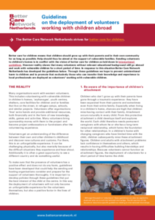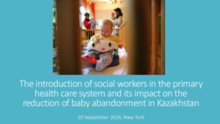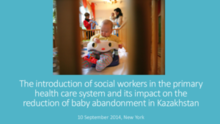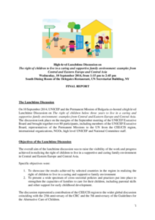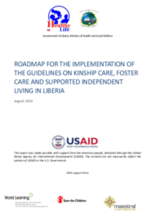Displaying 421 - 430 of 507
To gain insight into how practitioners can best meet the needs of grandfamilies, 40 custodial grandmothers and their adolescent grandchildren were interviewed in this study.
This practice brief provides an overview of critical self-reflection questions that can be used, in a variety of ways, for training purposes for professionals in the US who work with grandparents raising grandchildren.
In the fall of 2007, Ramsey County Community Human Services (RCCHSD) was one of five sites chosen as recipients of a grant from the U.S. Department of Health and Human Services Children’s Bureau (USDHHS) for the“Using Comprehensive Family Assessments to Improve Child Welfare Outcomes” project, to develop a model of comprehensive family assessment to be used in child welfare.
Through these guidelines BCN Netherlands hopes to prevent unintentional harm to children and to promote that exclusively those who can transfer their knowledge and experience to local professionals are deployed as volunteers working with vulnerable children.
This article discusses professional discretion in relation to placing a child outside the family, as understood by Malawian social workers.
On 10 September 2014, UNICEF and the Permanent Mission of Bulgaria co-hosted a high level Lunchtime Discussion on The right of children below three years to live in a caring and supportive family environment: examples from Central and Eastern Europe and Central Asia. In its presentation at the discussion, Kazakhstan demonstrated how the integration of social workers and outreach services in the health sector is reducing baby abandonment in pilot areas of the country.
This document reports on an Institutional Learning Process that has critically analysed the impact and effectiveness of Terre des hommes’ (Tdh) engagement in Albania over the last 14 years. It looks at the role Tdh has played in the emergence of a State Child Protection System (CPS) in Albania.
On 10 September 2014, UNICEF and the Permanent Mission of Bulgaria co-hosted a high level lunchtime discussion on the right of children below three years to live in a caring and supportive family environment: examples from Central and Eastern Europe and Central Asia. Kazakhstan showed how the integration of social workers and outreach services in the health sector is reducing baby abandonment in pilot areas of the country.
On 10 September 2014, UNICEF and the Permanent Mission of Bulgaria co-hosted a high level Lunchtime Discussion on The right of children below three years to live in a caring and supportive family environment: examples from Central and Eastern Europe and Central Asia.
This “roadmap” document outlines the recommended implementation strategies and activities for strengthening family- and community-based alternative care in Liberia. It accompanies the Guidelines on Kinship Care, Foster Care and Supported Independent Living (the Guidelines) and the Capacity Building Plan to Implement the Guidelines (CBP).

